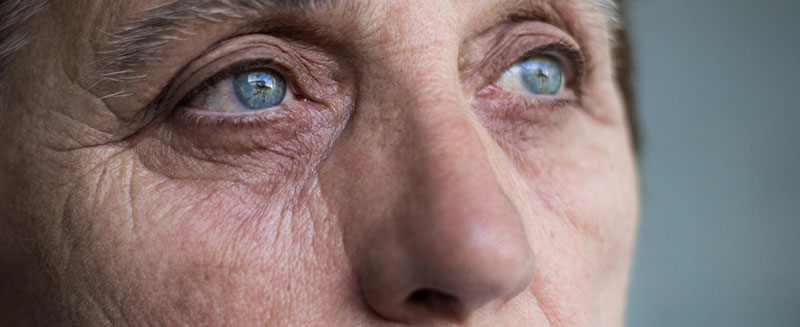
Senior vision often changes naturally, but dementia can bring about significant changes as well.
The intricate steps involved in making it possible for us to see are remarkable. In the blink of an eye, our brains are able to take transmitted data from our surroundings, decipher that data in accordance with feedback from our other senses, thoughts, and experiences, and then formulate an understanding of the data to help make us aware of what it is we are seeing.
It is understandable then that Alzheimer’s can impact senior vision, resulting in misconceptions and visual deficits, especially in the areas of:
- Depth perception
- Color perception
- Contrast
- Movement recognition
- Peripheral sight
As if that were not challenging enough, seniors with dementia may experience an altered sense of reality in the form of hallucinations. For instance, imagine a person with Alzheimer’s disease or other type of dementia sees a shadow on the ground. The senior might mistake it for something harmless, like the family’s pet cat, or a threat, like a burglar. Further types of visual misperceptions in dementia may include:
- Misinterpreting their own reflections in a window or mirror for someone else. This can lead the senior to believe somebody else is there, and in the case of a bathroom mirror, may lead the senior to refrain from going in when needed, causing discomfort and distress.
- Believing that images on TV are real and taking place in the room.
- Problems with sitting in a chair or on the toilet, fearing they will fall.
- Feeling overwhelmed in overstimulating settings that create confusion.
- Reaching out for things that are not there, or missing the mark in attempting to pick up something.
- Difficulty with eating and drinking.
Try these tips from our experts in dementia care in Oakville and surrounding areas to assist a senior with dementia who is challenged by eyesight changes:
- Make sure there is enough light throughout the home, and take away any items that are causing stress or visual confusion if possible.
- Utilize contrasting colors. For instance, serve a light-colored cream soup in a dark-colored bowl.
- Close all shades or draperies at night as well as whenever the sunlight causes a glare.
- Use adaptive equipment like remote controls and phones with bigger buttons to help empower the senior to maintain self-reliance regardless of visual problems.
At Compassionate Nursing Services, a provider of professional dementia care in Oakville and nearby areas, we’re committed to making sure the older adults we care for are always safe and thriving. Our highly trained dementia care specialists understand the visual and other changes that develop, and are equipped with creative, thoughtful approaches to help.
To learn more about our in-home dementia care solutions, or to request additional resources associated with taking care of a senior at home, call us today at 314-432-4312.
